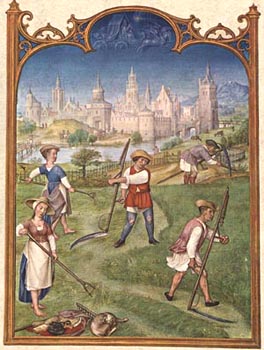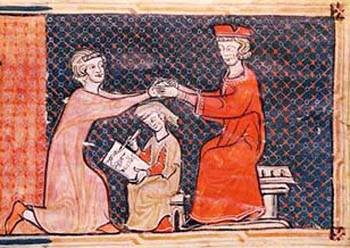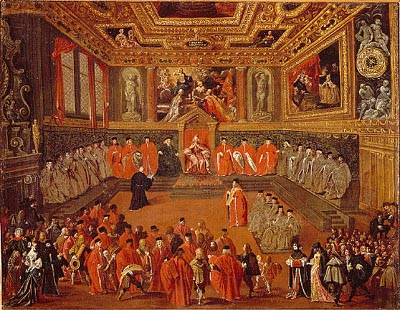 |
Organic Society
The City and Its Nobility
Plinio Corrêa de Oliveira
Given that according to Natural Law a city is a gathering of people, it is senseless to affirm that the feudal lord’s only interest in its development was for his own advantages. It is revolutionary to imagine that the feudal lord was only motivated by personal interest. Such a mentality does not understand that when a man is Catholic - truly Catholic - his actions are generally disinterested.

Was the servant free when he went to a city? |
This revolutionary obliteration of the reality is similar to those who would suppose that parents raise and form their children only for their own personal advantage, so that when they are old and can no longer provide well for themselves, their children will help them. This is not the primary reason they educate their children. They do so because they are parents. They follow an instinct that impels them to do good for their children. A certain advantage may come from that formation to assure their well-being when they become old. This is something reasonable that helps them to follow the good natural instinct, but it is not the main purpose of their action.
A true lordship must be compared with the paternal instinct for us to understand what it was. A man who was a dominus, a Catholic lord, instinctively sought the general well-being of that society under his responsibility and stimulated it to perfection.
The good characteristics of this instinct need to be studied, as well as its weaknesses and shortcomings that can produce its decadence– as historically they did.
An apparent liberty
When a servant would leave the fields and go to the city, would he become free? Was that liberty a moral good per se, or did that servant continue to be subordinate to his lord or some other authority?
To be free is an absolute good for the modern man, especially the North American, since the United States is the country that more fully realized the motto of the French Revolution: liberty, equality and fraternity.
I believe, however, that the reasoning behind that revolution was overly simplistic. According to it, since a man is a rational being with his own will, the more he governs himself using his reason and exerts his own will, the more fully he exercises his full capacities as a man. Thus, to be free is to have the capacity to do whatever his reason indicates by a means chosen by his will. Such self-governance of each man over himself would be delectable and make life happy. This is what is understood as “liberty,” which generates “equality and fraternity.” It was this simplistic reasoning that formed the mentality of present day generations in many countries.
Those men who enjoy this kind of liberty have no special obligations to others. Each is equally uncommitted. For this reason they are completely isolated and alone amid the multitude. This is the consequence of such a liberty.

Medieval society was built on bonds. Above, a prosecutor paying homage to his feudal lord. |
Living together in a Catholic society constitutes something different. The mutual assistance of men with unequal gifts is an obligation of justice and charity. The regime where relationships are established in order to help one another is just and better follows the natural order. The proportional dependence of one on another establishes security and well-being in society.
Consider, for example, the city of Rothenberg in Germany in the 13th century, when it was already a well-established city. A man living in Rothenberg was limited in the exercise of his will. He had to respect the traditions and standards of the city. After a servant left his feudal lord and went there, he had to follow the norms of the city. He was free to go somewhere else before he went to Rothenberg, but once he was there, he had to curb his will to follow its traditions and way of being, which could well be more forceful than laws.
Now, according to the North-American mentality, for a servant to be completely free he should be able to follow or not follow the customs and traditions as he chooses. That inhabitant of Rothenberg, however, knew that its traditions and models represented centuries of accumulated wisdom that taught the people to do things in a certain way for their own benefit and well-being. He would never think of living independent of others or the customs of the city, because he knew that things would go awry. It would be foolish. Therefore, his dependence on those traditions and models were a necessity.
Consequently, we see that the servant who left his feudal lord to go to a city would not be free according to the modern understanding of freedom. He would have to follow another set of rules that would bind him to another authority – be it an urban noble, an elected major or the guild master.
This is the reality that the modern myth of liberty does not want to see.
The seeds of today's imaginary liberty started to be sown by men like Arnold of Brescia. He preached a new political philosophy that called for men to reject any dependence and the whole structure of rights and duties that governed medieval society. Those revolutionary theories played an important role in obliterating the notion of what a Catholic city should be.
I cannot see why we do not have the right to contest such theories and present our own, refuting their lies and creating conditions to restore the organic concept of the city.
The urban nobility – different from the feudal
Something historians often omit is the special type of nobility called the Patriciate that appeared in the medieval cities. It was constituted by the ensemble of wealthy families of a city, which sometimes received titles of nobility from the King. It was a type of nobility without fiefs. Its members were less than the feudal nobility, but they were more than the plebeians. This type of nobility was common in German cities such as Lubeck, Bremen, Hamburg or Danzig. In Italy Venice presents a typical case of an urban nobility. Almost all the cities in Italy had an urban nobility.
This urban nobility was not feudal; they lived in the city, not the countryside. It was quite conscious of the situation of its city and naturally assumed a type of paternity over the whole city. In effect, it became a personification of the city, its desires and needs. This urban nobility could have continued to dedicate itself to commerce and have maintained its noble status, as in Venice, Genoa and Lubeck.

Venice generated a commercial aristocracy that rivaled the military and political nobility in splendor. Above, an audience at the Doge's Palace. |
Someone might raise an objection: “Isn’t commerce and trade irreconcilable with nobility?” In the opposite sense another could ask: “Isn’t there a way to give a noble character to commerce?”
Other questions could follow: “Isn’t nobility essentially linked to the sovereignty of a fief? Are there nuances in nobility? Could we perhaps speak of a first and greater nobility that is feudal, inseparable from government and military duties, and then of other smaller nobilities that would not be military?
To respond to these questions it seems necessary to define nobility. It is the class that lives for the common good and represents the ensemble of a social group.
Thus, one would say that it lives in a more excellent way for the common good when it exercises the political power in that society. It also may happen, however, that because of its prestige and influence, an urban nobility can achieve better results than others who hold the political power of an area in their hands. For example, the nobility of Venice as an ensemble generated that magnificent work of art called the Doge’s Palace, (1) which reflects a spiritual and cultural leadership more valuable than the exercise of power.
We will examine this topic more in the next article.
1. As well as being the Doge's residence, the palace housed the political institutions of the commercial aristocraticy that ruled Venice. There was also a facility for citizens to submit written complaints at, known as the Bussola chamber.
Continued

Posted January 8, 2010

  | | Prof. Plinio |
Organic Society was a theme dear to the late Prof. Plinio Corrêa de Oliveira. He addressed this topic on countless occasions during his life - at times in lectures for the formation of his disciples, at times in meetings with friends who gathered to study the social aspects and history of Christendom, at times just in passing.
Atila S. Guimarães selected excerpts of these lectures and conversations from the trancripts of tapes and his own personal notes. He translated and adapted them into articles for the TIA website. In these texts fidelity to the original ideas and words is kept as much as possible.

Related Topics of Interest
 An Élan for Perfection Should Exist in All Classes An Élan for Perfection Should Exist in All Classes
 How Man Should Act over His Natural Environment How Man Should Act over His Natural Environment
 Tradition, Stagnation and Progress Tradition, Stagnation and Progress
 The Natural and Unnatural Decline of the Clan The Natural and Unnatural Decline of the Clan
 Organic Society and a Desire for Heaven Organic Society and a Desire for Heaven
 The True Friends of the People Are Traditionalists The True Friends of the People Are Traditionalists
 Revolution and Counter-Revolution - Overview Revolution and Counter-Revolution - Overview

Related Works of Interest
|
|
Organic Society | Social-Political | Home | Books | CDs | Search | Contact Us | Donate

© 2002-
Tradition in Action, Inc. All Rights Reserved
|
 |
|